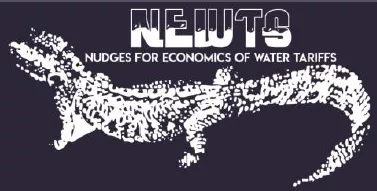NEWTS
Nudges for Economics of Water Tariffs

Partners
Partners
CREM - University of Rennes I
GAEL - University Grenoble Alpes
GRANEM - University of Angers
OEG - University of Oviedo
LAREQUAD - University of Tunis
EPRU - University of Cape Town
Abstract
Abstract
The research program addresses the issue of household water demand management. Prima facie, it aims to provide a socio-economic assessment of green nudging policies, focusing on water consumption controlling and proper understanding of the charging system by the households, taking into account adjustments in the pricing policy that nudges may generate (in view of their effects on water demand functions). From an operational point of view, it consists in developing a micro-simulation model, based on econometric estimates of household water demands, to assess the socio-economic returns of mix policies, combining nudges and pricing instruments, and identify financially sustainable DSM (demand-side management) policies to improve current water utility tariffs. The program is designed around various methodologies. The effects of nudges on household water consumptions are examined through the realization of controlled experiments, in the lab and in the field. Randomized controlled trials are performed in Gijon (Spain), Saint Paul (Reunion Island - France) and Sfax (Tunisia). Econometric estimations of residential water demand are carried out to measure basic water needs of the households, price-sensitivities of demand and perceived prices of water. Econometric exercises are implemented before and after the nudging campaigns, in order to infer the effects of BIs (behavioral interventions) on the latter three factors and identify the transmission channels through which nudges modify the water demand functions of the households. This knowledge about the water demand functions, as provided by econometric analysis, combined with databases used their estimation enables (i) to assess the socio-economic performance of the tariff; (ii) to infer the effects of nudges on this socio-economic performance; (iii) to identify optimal policies, according to well-defined decision criteria for local public decision-makers, in various analytical and regulatory frameworks. This evaluation process is carried out through a scoreboard and the use of appropriate indicators in accordance with the objectives of EU Water Framework Directive (affordability, incentive character of pricing, equity, economic welfare and quality of funding). In fine, all of these elements articulate to construct a DST (decision support tool) that can be used to inform decision-making about Water Utility DSM policy. Simplified version of the DST will be posted on line.
Project structure:
Project structure:
WP1 Nudges set-up, lab experiments and analysis: implements the tasks related to behavioural economics (design of nudges, implementation and analysis of related lab experiments, building of the Multi-agent model (considering the feedback from lab experiments))
WP2 Econometric models and their application: applies the econometric methods to estimate water demand functions of the households, builds the micro-simulation model
WP3 Dashboard and Evaluations: includes the tasks needed to assess targeted local DSM policies
WP4: Simulation models and Guidelines: consolidates the outcomes from previous tasks into simplified micro-simulation models, pedagogical sheets and methodological guidelines and procedures to facilitate exploitation of the developed tools and models
WP5 Nudge case studies: implementation of the field experiments (Saint Paul, Gijon, Sfax); analysis of households/stakeholders feedbacks
WP6 Dissemination communication training and exploitation: implements actions to reach out all Stakeholders as well as the civil society WP7 Project coordination & management: assures project coordination and management
Outcomes and expected impact:
Outcomes and expected impact:
Outcomes:
- Basic knowledge - linking behavioural interventions and water demand functions of the households
- Basic knowledge - development of "new" socio-economic performance indicators for water management
- Basic knowledge - making progress with behavioural interventions (in the field of water)
- Micro-simulation models and DSTs tailored for studies site (4)
- Simplified version of DSTs
- Multi-agent model for design of nudging campaigns
- Smart mobile application to provide real-time information on consumption and marginal price of water
Expected impacts:
Responding to the decision-making gaps on water management Newts aims to inform local decision-making process with dedicated DSTs, based on econometric estimates of water demand functions of the households, to be used by stakeholders involved in water management for diagnostic, simulation and projection purposes. Besides, Newts contributes to the development of "new" indicators that can be used (i) for the development of impact investments; (ii) to monitor progress towards WDF and SDGs at various levels of public interventions (information provided by local dashboards can be consolidated into aggregated dashboards). Last, the project targets an improvement in stakeholder skills regarding the socio-economic dimension of Water Utility DSM policy, with specific actions based on simplified version of the DSTs.
Towards efficient water uses and responsible co-management Better management of their water uses by households with significant reductions in over-consumptions and water bills. Less pressure on the resource and environmental improvement with reduction of water wastage. Raising public awareness on high water consumption issues through nudges. Improved information in the context of the relationship between public authorities, private water companies and civil society organizations.